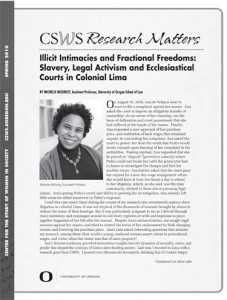UO law professor Michelle McKinley’s paper “Illicit Intimacies and Fractional Freedoms: Slavery, Legal Activism and Ecclesiastical Courts in Colonial Lima” is now available online in the Spring 2010 issue of CSWS Research Matters. CSWS supported McKinley’s work with a 2009 Faculty Research Grant.
“My work situates enslaved women as legal agents who simultaneously occupied multiple identities as mistresses, workers, wives, mothers, wet nurses, and domestics that conditioned their experience of slavery. Despite the variable outcomes of their lawsuits, I show how enslaved women used channels of affection and sexuality to access freedom and prevent the generational transmission of enslavement to their children. Although attentive to the overarching oppressive structures of slavery, my project reveals instances in the lives of enslaved women when they acted as subjects other than human property.
 “More broadly, a review of the voluminous amounts of slave litigation demonstrates that access to courts indubitably affected the construction of colonial slaveholding societies, potentially constrained the repressive behavior of slave owners, and afforded the enslaved a measure of autonomy over their lives in bondage. A retrospective look at these proceedings tells us how litigants and their advocates strategically exploited the rhetorical power of liberty within the courts, even when their lived realities were decidedly unfree and unequal,” McKinley writes.
“More broadly, a review of the voluminous amounts of slave litigation demonstrates that access to courts indubitably affected the construction of colonial slaveholding societies, potentially constrained the repressive behavior of slave owners, and afforded the enslaved a measure of autonomy over their lives in bondage. A retrospective look at these proceedings tells us how litigants and their advocates strategically exploited the rhetorical power of liberty within the courts, even when their lived realities were decidedly unfree and unequal,” McKinley writes.


